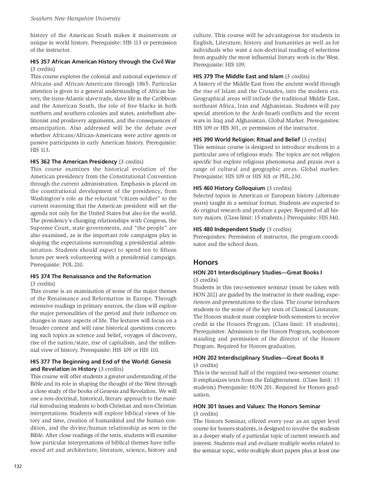Southern New Hampshire University history of the American South makes it mainstream or unique in world history. Prerequisite: HIS 113 or permission of the instructor. HIS 357 African American History through the Civil War (3 credits) This course explores the colonial and national experience of Africans and African-Americans through 1865. Particular attention is given to a general understanding of African history, the trans-Atlantic slave trade, slave life in the Caribbean and the American South, the role of free blacks in both northern and southern colonies and states, antebellum abolitionist and proslavery arguments, and the consequences of emancipation. Also addressed will be the debate over whether Africans/African-Americans were active agents or passive participants in early American history. Prerequisite: HIS 113. HIS 362 The American Presidency (3 credits) This course examines the historical evolution of the American presidency from the Constitutional Convention through the current administration. Emphasis is placed on the constitutional development of the presidency, from Washington’s role as the reluctant “citizen-soldier” to the current reasoning that the American president will set the agenda not only for the United States but also for the world. The presidency’s changing relationships with Congress, the Supreme Court, state governments, and “the people” are also examined, as is the important role campaigns play in shaping the expectations surrounding a presidential administration. Students should expect to spend ten to fifteen hours per week volunteering with a presidential campaign. Prerequisite: POL 210. HIS 374 The Renaissance and the Reformation (3 credits) This course is an examination of some of the major themes of the Renaissance and Reformation in Europe. Through extensive readings in primary sources, the class will explore the major personalities of the period and their influence on changes in many aspects of life. The lectures will focus on a broader context and will raise historical questions concerning such topics as science and belief, voyages of discovery, rise of the nation/state, rise of capitalism, and the millennial view of history. Prerequisite: HIS 109 or HIS 110. HIS 377 The Beginning and End of the World: Genesis and Revelation in History (3 credits) This course will offer students a greater understanding of the Bible and its role in shaping the thought of the West through a close study of the books of Genesis and Revelation. We will use a non-doctrinal, historical, literary approach to the material introducing students to both Christian and non-Christian interpretations. Students will explore biblical views of history and time, creation of humankind and the human condition, and the divine/human relationship as seen in the Bible. After close readings of the texts, students will examine how particular interpretations of biblical themes have influenced art and architecture, literature, science, history and 132
culture. This course will be advantageous for students in English, Literature, history and humanities as well as for individuals who want a non-doctrinal reading of selections from arguably the most influential literary work in the West. Prerequisite: HIS 109. HIS 379 The Middle East and Islam (3 credits) A history of the Middle East from the ancient world through the rise of Islam and the Crusades, into the modern era. Geographical areas will include the traditional Middle East, northeast Africa, Iran and Afghanistan. Students will pay special attention to the Arab-Israeli conflicts and the recent wars in Iraq and Afghanistan. Global Marker. Prerequisites: HIS 109 or HIS 301, or permission of the instructor. HIS 390 World Religion: Ritual and Belief (3 credits) This seminar course is designed to introduce students to a particular area of religious study. The topics are not religion specific but explore religious phenomena and praxis over a range of cultural and geographic areas. Global marker. Prerequisite: HIS 109 or HIS 301 or PHL 230. HIS 460 History Colloquium (3 credits) Selected topics in American or European history (alternate years) taught in a seminar format. Students are expected to do original research and produce a paper. Required of all history majors. (Class limit: 15 students.) Prerequisite: HIS 340. HIS 480 Independent Study (3 credits) Prerequisites: Permission of instructor, the program coordinator and the school dean.
Honors HON 201 Interdisciplinary Studies—Great Books I (3 credits) Students in this two-semester seminar (must be taken with HON 202) are guided by the instructor in their reading, experiences and presentations to the class. The course introduces students to the some of the key texts of Classical Literature. The Honors student must complete both semesters to receive credit in the Honors Program. (Class limit: 15 students). Prerequisites: Admission to the Honors Program, sophomore standing and permission of the director of the Honors Program. Required for Honors graduation. HON 202 Interdisciplinary Studies—Great Books II (3 credits) This is the second half of the required two-semester course. It emphasizes texts from the Enlightenment. (Class limit: 15 students) Prerequisite: HON 201. Required for Honors graduation. HON 301 Issues and Values: The Honors Seminar (3 credits) The Honors Seminar, offered every year as an upper level course for honors students, is designed to involve the students in a deeper study of a particular topic of current research and interest. Students read and evaluate multiple works related to the seminar topic, write multiple short papers plus at least one
